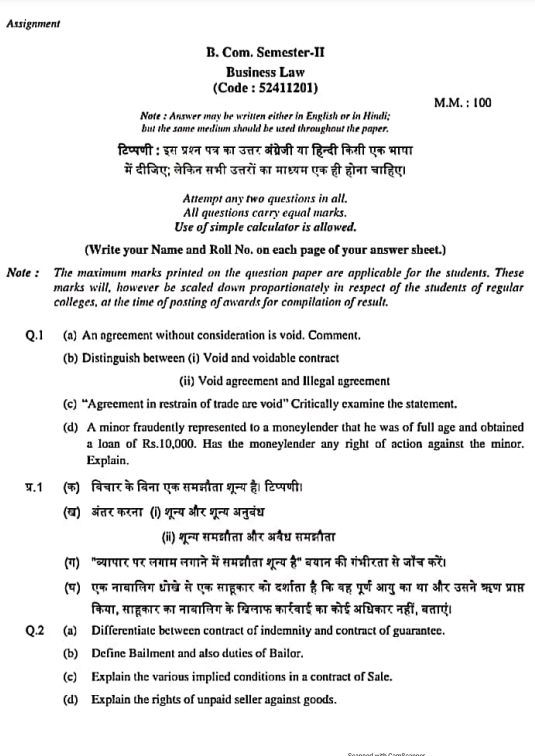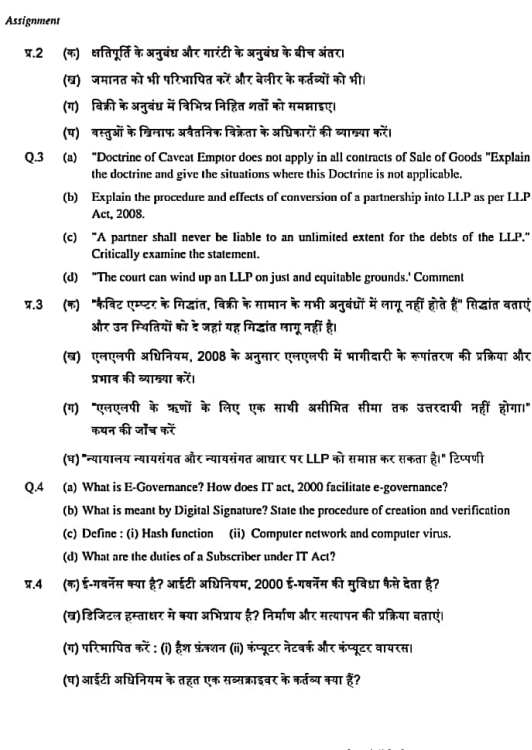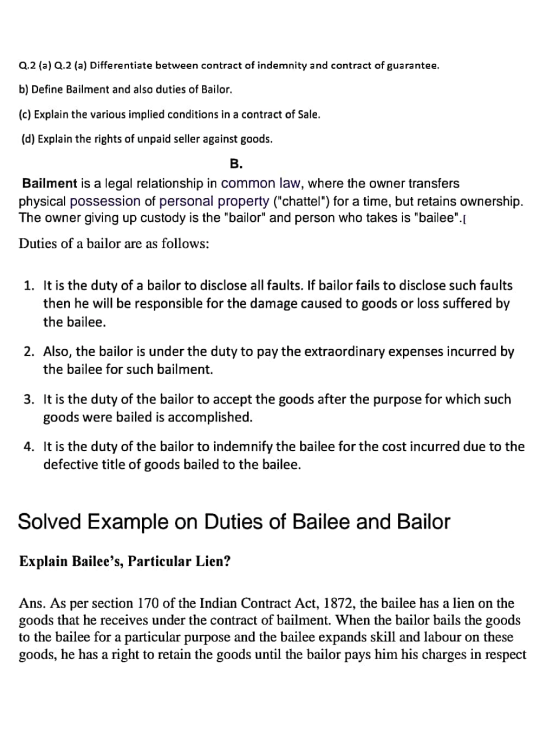Business Law Question Paper
Welcome to our weblog dedicated to Business Law Question Paper Whether you are a pupil preparing for assessments or a expert seeking to brush up on legal ideas, our collection of query papers and observe substances is designed that will help you be triumphant. Business law is a important vicinity of have a look at that encompasses diverse prison standards governing business transactions, corporate systems, and regulatory compliance. In this weblog, you’ll find beyond exam papers, particular explanations, and key insights to be able to decorate your information and application of enterprise regulation standards. Dive in and start your adventure toward getting to know business law today!3
- Introduction : Business Law Question Paper
- Download : Business Law Question Paper
- Syllabus : Business Law Question Paper
- Exam Pattern : Business Law Question Paper
- Significance of Business Law Question Paper
- Tips for Good Preparation
- FAQs : Business Law Question Paper
Introduction : Business Law Question Paper
The Business Law exam is your chance to showcase your understanding of the legal principles that govern commercial activities. This introduction will equip you for a successful exam experience.
What to Expect:
- The question paper will likely cover various areas of Business Law, such as:
- Contract Law (Formation, Types, Breach, Remedies)
- Sale of Goods Act
- Negotiable Instruments Act (Bills of Exchange, Cheques, Promissory Notes)
- Partnership Act
- Company Law
- Consumer Protection Act
- Business Torts
- Questions can be in various formats, including:
- Multiple Choice: Test your knowledge of key legal concepts.
- Short Answer: Explain specific legal terms or principles.
- Case Studies: Apply legal concepts to analyze real-world business scenarios.
- Essay: Discuss a broader legal topic with well-structured arguments.
- Be prepared to demonstrate your ability to:
- Identify relevant legal issues in a business context.
- Analyze legal principles and their application to specific situations.
- Apply legal reasoning to arrive at sound conclusions.
- Communicate legal concepts clearly and concisely.
Tips for Success:
- Know the Law: Revise core legal principles, focusing on recent amendments if applicable.
- Practice Makes Perfect: Solve sample questions and past papers (if available) to understand the format and application of legal knowledge.
- Structure is Key: Organize your answers logically, using legal terminology accurately.
- Support Your Arguments: Use relevant legal principles, case laws (if allowed), and statutory provisions to strengthen your answers.
- Manage Your Time: Allocate time strategically based on the weightage of each section and the complexity of questions.
- Read and Reread: Carefully read instructions and proofread your answers to avoid careless mistakes.
Download : Business Law Question Paper
| Question Paper | Question Paper Download |
|---|---|
| Business low paper | Download Here |



Syllabus : Business Law Question Paper
Business Law Question Paper Syllabus
| Unit No. | Unit Title | Topics Covered |
|---|---|---|
| 1 | Introduction to Business Law |
– Definition and scope of business law – Importance and relevance in business |
| 2 | Law of Contracts |
– Essential elements of a contract – Types of contracts – Breach of contract and remedies |
| 3 | Company Law |
– Formation and incorporation of a company – Types of companies – Roles and responsibilities of directors and shareholders |
| 4 | Partnership Law |
– Nature and types of partnerships – Rights and duties of partners – Dissolution of partnership |
| 5 | Consumer Protection Law |
– Consumer rights and responsibilities – Consumer dispute redressal mechanisms – Important case laws |
| 6 | Employment Law |
– Employment contracts – Employee rights and obligations – Termination of employment |
| 7 | Intellectual Property Law |
– Types of intellectual property – Registration and protection of IP – Infringement and remedies |
| 8 | Regulatory Compliance |
– Importance of regulatory compliance – Major regulatory bodies – Compliance strategies |
Exam Pattern : Business Law Question Paper
Business Law Question Paper Exam Pattern
| Aspect | Details |
|---|---|
| Paper Structure | Divided into sections: theoretical, practical, objective, and subjective. |
| Marking Scheme | Clear allocation of marks for each question, including partial marking. |
| Section-wise Weightage | Varied weightage for different sections, emphasizing key topics and skills. |
| Question Types | Mix of objective (MCQs), subjective, and practical questions to assess diverse skills. |
| Time Allocation | Adequate time provided for each section, requiring strategic time management. |
| Practical Component | Includes a practical section to evaluate hands-on application of Business Law concepts. |
| Difficulty Levels | Questions range from easy to challenging, ensuring a comprehensive assessment. |
| Use of Legal Principles and Cases | Encourages the incorporation of legal principles and case laws for certain questions. |
| Previous Years’ Trends | Examines trends in question patterns from previous years, aiding focused preparation. |
| Overall Purpose | Designed to comprehensively assess students’ understanding, application, and analytical skills in Business Law. |
Significance of Business Law Question Paper
It serves as a guiding beacon, revealing crucial details about the exam, such as its structure, types of questions, and grading criteria. Immersing oneself in this document provides a significant edge in preparation.
Deciphering the Examination Enigma
Gain insights into the overall structure of the examination. How many segments constitute the test? What types of queries can be anticipated (multiple-choice, dissertations, concise responses)? How is time distributed among the different sections?
Question Repository
Encounter authentic examination queries that have previously been featured. This enables one to assess the complexity level, identify recurring motifs, and devise effective approaches to address them.
Channeling Your Study Efforts
Scrutinize past examination documents to identify the pivotal subjects likely to be assessed. This invaluable discernment aids in prioritizing study materials and ensures thorough familiarity with topics carrying significant weight.
Honing Your Aptitude:
Actively apply acquired knowledge by tackling genuine examination queries. This not only evaluates comprehension but also highlights areas necessitating additional attention.
Boosting Confidence
Acquaintance with the examination layout and question styles fosters self-assurance. Awareness of what to anticipate diminishes apprehension, enabling one to focus on demonstrating proficiency.
Formulating Examination Tactics
Practice effective time management by responding to queries under timed constraints, mirroring actual examination conditions. This facilitates the development of strategies for prioritizing queries and efficiently allocating time.
Tips for Good Preparation
Here are some tips for good preparation for exams :
Commence Early
Avoid procrastination to distribute tasks, effectively manage stress, and enhance information retention.
Craft a Timetable
Formulate a comprehensive plan detailing study sessions, breaks, deadlines, and other obligations. Employ a calendar, planner, or project management tool for meticulous organization.
Compile Resources
Identify necessary materials like textbooks, notes, past papers, online references, or specific tools. Assure accessibility and systematic arrangement of all resources.
Acknowledge Your Learning Style
Tailor study techniques to your strengths, whether through reading, listening, hands-on activities, or a blend of these methods.
Active Participation
Move beyond passive reading or listening. Engage actively with the content by taking notes, summarizing key points, creating flashcards, or practicing with problem-solving exercises.
Embrace Diversity
Vary your study methods to stave off monotony and bolster information retention. Utilize different resources, such as textbooks, online lectures, practice tests, or collaborative study sessions.
Prioritize Sleep
Aim for 7-8 hours of nightly rest to optimize information absorption and retention.
Healthy Lifestyle
Nourish your body and mind with nutritious meals and regular physical activity, promoting cognitive function and stress management.
Incorporate Breaks
Schedule regular intervals to rejuvenate your mind, preventing burnout. Engage in movement, stretches, or brief walks during breaks.
Select a Productive Study Setting
Opt for a well-lit, distraction-free environment for focused study sessions.
Mitigate Distractions
Store your phone, mute notifications, and avoid multitasking for concentrated learning.
Master Time Management
Efficiently allocate time during study sessions and practice answering questions within specified time limits if applicable.
FAQs : Business Law Question Paper
Q1: What topics are typically covered in a Business Law question paper?
A1: Studying Business Organisation And Management provides insights into the principles and practices of managing businesses effectively. It helps students understand organizational structures, decision-making processes, and strategies for achieving business objectives.
Q2: How can I effectively prepare for a Business Law exam?
A2: Effective preparation involves studying your course materials thoroughly, reviewing class notes, and reading recommended textbooks. Additionally, practicing with past question papers, understanding key legal cases, and discussing complex topics with classmates or professors can significantly enhance your preparation.
Q3: Are case studies included in Business Law question papers?
A3: Yes, case studies are commonly included in Business Law question papers. They are used to assess a student’s ability to apply legal principles to real-life business scenarios. These questions require critical thinking and a practical understanding of the law.
Q4: What types of questions are asked in Business Law exams?
A4: Business Law exams typically feature a mix of multiple-choice questions (MCQs), short answer questions, long essay-type questions, and case studies. This variety ensures a comprehensive assessment of both theoretical knowledge and practical application skills.